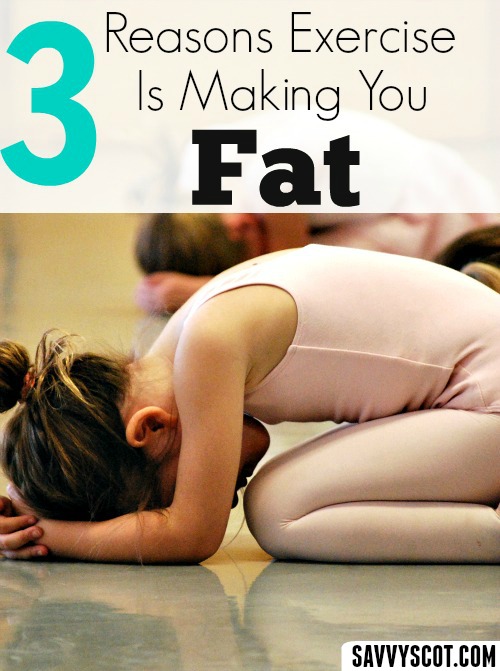Calories in, calories out. Losing weight comes down to simple maths. Exercise seems like the natural solution when you’re trying to lose weight. Start moving and the pounds should fall off.
Not necessarily.
Sometimes starting an exercise program can have the opposite effect. You’re working your butt off but the scales are moving the wrong way. Here are three reasons why exercise is making you fat.
1 – You’re exercising too much
There’s such a thing as too much exercise and it can lead to weight gain. Your body is smart. It knows when it needs to hold on to fat. You might think that two hours of exercise seven days per week will lead to rapid fat loss when in fact it could be jeopardising your results. One hour, four times a week might be a better option.
Excess exercise can have a negative impact on cortisol levels. If your cortisol levels remain high then your adrenal glands aren’t working correctly and instead of shedding the pounds your body is retaining fat and water and you’re gaining weight.
The fix — If you’ve been going overboard with your exercise routine it might be time to scale back. Rest is as important to weight loss as physical activity. Your body needs to recover after a tough workout. Take a day off between sessions and you might see better results than if you were working out seven days a week. If you’re worried about your cortisol levels, it’s best to have a chat with your doctor.
2 – You’re eating more
You hit the gym, warm up on the stationery bike, lift half an hour of weights, and finish off with a quick twenty minute run on the treadmill. Awesome work. You get home, fix yourself dinner, and your sweet tooth awakens. You’ve worked out for about an hour you deserve a bowl of ice cream.
Did you go for a power walk at lunch? Your friends are telling you that those after work drinks aren’t going to damage your weight loss progress, in fact, you earned them for all your hard work.
Hold up.
If you want exercise to work, you need to reward yourself with something other than food.
It’s easy to think you need to eat more calories because you’re exercising but the truth is you probably don’t. You’d need to do a significant amount of exercise — say training for a marathon or triathlon — to require the extra calories.
The reward mentality has to go.
The fix — Keep a food and exercise diary for a month. Note down exactly what you put into your mouth and how much exercise you do. At the end of each day calculate how many calories you’re burning versus the amount you’re eating. You might be surprised that the difference isn’t what you expected. Tweak your habits to get the desired results. Why not speak to a nutritionist at your gym to give you some tips on healthy treats if you’re having a hard time controlling your tastebuds.
3 – You’re doing the wrong type of exercise
Not all exercise is created equal. Running, cycling, walking and other cardiovascular activities are great but they are complementary to an effective exercise program.
Women are guilty of going crazy on cardio machines in hope of losing unwanted weight and getting lean. Unfortunately, cardio has its limits and after a time you can reach a plateau and see no results or worse, gain weight.
Weight training on the other hand can have the desired effect. While many people are under the impression that weight training will lead to bulkiness and a higher number on the scale, that’s not necessarily the case. Women aren’t predisposed to bulk up unless they take extra supplements and modify their diets to the extreme.
You need muscle to look, feel and stay lean. Muscle is denser than fat. It takes up less room on your body. There’s a common misconception that muscle weighs more than fat but it’s not true. A pound is a pound whichever way you look at it.
The fix — Mix things up. Variety is the spice of life, and it’s also the key to ensuring the exercise that you do has a positive impact on your weight loss. Combine cardio and weight training for best results. Alternate between two weight training sessions and three cardio sessions one week to three weight sessions and two cardio the following week. Every six to eight weeks change the type of exercises that you do so that your body doesn’t have a chance to get used to the same workout.
Exercise can be an effective method for weight loss but it’s not enough just to go for a run a few times per week. Combining regular cardio and weight training with a balanced diet rich in fruit, vegetables, grains, lean protein, fat and carbohydrates can help you stay healthy, get lean and not worry about the number on the scale.
Bio
 Kasia Radzka is an author, blogger, mum and wannabe athlete. In her lack of spare time she likes to run marathons, eat fine food, discover new places, and write action-packed novels. You can learn more at www.kasiaradzka.com
Kasia Radzka is an author, blogger, mum and wannabe athlete. In her lack of spare time she likes to run marathons, eat fine food, discover new places, and write action-packed novels. You can learn more at www.kasiaradzka.com


Great post! Your body is a complex machine but it’s clever too. Exercise you once did (that you would benefit from) no longer has the same effect. I always try to mix things up by chopping and changing my routines.